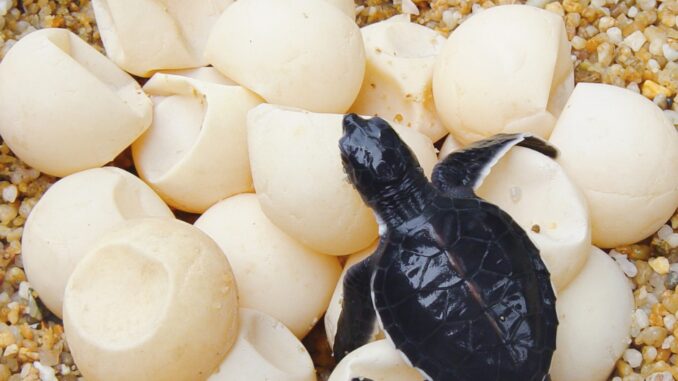
Renowned for their omnivorous appetites, raccoons devour a diverse array of foods, ranging from fruits and vegetables to insects and smaller animals. Yet, the question arises: do these resourceful mammals target turtles, surpassing the challenge posed by their protective shells?
Yes, raccoons can eat turtle eggs, hatchlings, and even fully-grown turtles. Their opportunistic feeding behavior leads them to explore almost anything edible, and turtles are no exception. However, the hunting prowess of raccoons isn’t universal, with some turtle species proving adept at self-defense, outmatching raccoons in size.
Yet, when it comes to turtles, raccoons typically aren’t keen on making them their main course. While raccoons are opportunistic eaters, they usually find turtles less appealing due to their hard shells and the effort required to access their meat.
In the wild, raccoons are more likely to feast on insects, fruits, and small mammals. The interaction between raccoons and turtles is more about exploration than a hearty meal. Understanding the dietary preferences of raccoons sheds light on the dynamic relationships within the animal kingdom.
Table of Contents
Raccoons as Opportunistic Feeders:
Raccoons, recognized for their adaptability and intelligence, are indeed opportunistic feeders. Their omnivorous diet spans a wide range of foods, and this includes a notable appetite for turtles and their eggs.
Vulnerable Turtle Species
Certain turtle species face a higher risk of falling prey to raccoons, particularly those depositing eggs in accessible locations. Notably, the Blanding’s turtle, classified as a threatened species in North America, lays its eggs in shallow water or on the ground, rendering them susceptible to raccoon predation. Similarly, the snapping turtle, with its land-based egg-laying, becomes a target for raccoon attacks.
Vulnerabilities of Turtle Nests:
Turtle nests, with their hidden locations and soft, sandy surroundings, become prime targets for raccoon predation during the nesting season. Female turtles meticulously bury their eggs, but raccoons, armed with sharp senses and strong forelimbs, skillfully locate and consume these buried turtle eggs, presenting a significant threat to turtle reproduction.
Raccoons as Skilled Swimmers:
An additional factor intensifying the threat posed by raccoons to turtles is their proficiency in swimming. This aquatic ability enables raccoons to access turtle nesting sites located in aquatic environments, expanding the scope of their predation and presenting new challenges for conservationists striving to protect turtle populations.
Limitations in Turtle Shell Consumption:
While raccoons are capable of consuming smaller turtles whole they find it difficult to crack open the robust shells of adult turtles. Also, their focus often lies on the more vulnerable stage of turtle development – the eggs. This selective consumption influences the reproductive success of turtle populations.
Ecological Impacts:
The predation of raccoons on turtle eggs has broader ecological implications. As raccoons exploit these nests, they directly impact the survival rates of turtle embryos, potentially affecting the overall abundance and diversity of turtle species. The ripple effects extend throughout the ecosystem, highlighting the delicate balance between predator and prey in the natural world.
How to Protect Your Turtles from Being Eaten by a Raccoon
Here are some simple ways to keep raccoons away from your turtles:
- Strong Wire Cover: Use a tough wire cover, like chicken wire, to keep raccoons out. Make sure you can remove it to let turtles out during the day.
- Tricky Bait: Some experts use tasty bait to trap raccoons. But make sure the food is more tempting than turtles. Use traps that won’t hurt raccoons, like Havahart traps.
- Friendly Dogs: Dogs are excellent protectors. They can scare away raccoons with their strong sense of smell. Just check that your dog is friendly to turtles.
- Electric Fence: This might sound a bit much, but electric fences with timers can keep raccoons away at night. It won’t shock during the day, so it’s safe for kids.
- Solar Lights: Solar-powered lights that look like predator’s eyes can scare raccoons. Check out lights like the solar predator control light from Predator Guard.
Frequently Asked Questions (FAQs) About Raccoon-Turtle Interactions
Q1: Do raccoons actively seek out turtles as a food source?
A: Yes, raccoons are opportunistic feeders and, in certain situations, target turtles for their eggs, hatchlings, or even adult turtles. While not a primary food choice, raccoons are known to exploit the vulnerability of turtle nests, especially during the nesting season.
Q2: Why would raccoons choose to eat turtles over other available food sources?
A: Raccoons are known for their adaptability and diverse diet. While they typically consume a variety of foods, including fruits and small mammals, they may opt for turtles due to the accessibility of their eggs or hatchlings. Turtle nests, often laid in exposed or easily reachable locations, become appealing targets for raccoons.
Q3: Are all turtle species equally at risk of raccoon predation?
A: No, not all turtle species face the same level of risk from raccoon predation. Species that lay their eggs in accessible locations, such as shallow water or on the ground, are more vulnerable. Threatened species like the Blanding’s turtle, which lays eggs in shallow water, and snapping turtles, which lay eggs on land, are particularly susceptible.
Q4: Can raccoons harm adult turtles with their protective shells?
A: While raccoons may attempt to prey on adult turtles, the protective shells pose a formidable challenge. Raccoons find it difficult to crack open the robust shells of adult turtles. Therefore, their focus is often on the more vulnerable stages of turtle development, such as eggs and hatchlings.
Q5: How can individuals protect their turtles from raccoon predation?
A: There are several strategies to safeguard turtles from raccoons. Implementing strong wire covers, using tricky bait to trap raccoons without harming them, employing friendly dogs to deter raccoons, installing electric fences with timers, and utilizing solar-powered predator control lights are effective measures to protect turtles and their nests from raccoon threats.
